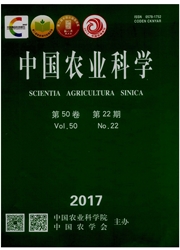

 中文摘要:
中文摘要:
【目的】探讨不同时间运输应激对猪免疫机能的影响及其相关细胞因子的调控作用。【方法】将不同运输时间的猪血清稀释后单独或与植物血凝素A(PHA)和脂多糖(LPS)混合后分别刺激正常猪外周血淋巴细胞,用噻唑蓝(MTT)比色分析法分别检测淋巴细胞增殖指数;另用ELISA方法检测试验猪血清中IL-1β、IL-2、IL-4、IL-6、IL-10及TNF-α含量的动态变化;分析淋巴细胞增殖指数的变化与各种细胞因子之间的相关性。【结果】经1h、2h、4h的运输应激后,1:32稀释的受试猪血清对T、B淋巴细胞转化能力均有影响,都是先升高,并以1h运输猪血清的刺激能力最强(P〈0.05),随后开始下降,到4h时降到最低。血清IL-2、IL-6、IL-10的含量变化均是在运输后1h时达到最高,随后开始下降并在4h时降到最低。其中IL-6、IL-10在4h时和对照组相比呈极显著的下降(P〈0.01),IL-24h和1h相比也呈现显著性下降(P〈0.05),IL-1β、IL-4及TNF—α等3种细胞因子含量运输前后和运输过程中均没有显著性的变化。【结论】运输应激可引起猪免疫机能的变化,且对免疫机能的影响存在时效性;相关性分析表明,血清中IL-6的水平有望成为一种重要的猪应激性免疫机能变化的判定指标。
 英文摘要:
英文摘要:
[Objective] The objective of this study was to explore the changes of immune function and regulation ofcytokines in pigs during truck-transportation. [Method] The peripheral blood lymphocytes (PBLs) proliferation of normal pigs were stimulated by the serum of stressed pigs alone in different dilution times or with plant haemagglutinin A (PHA) and lipopolysaccharides (LPS) separately. The influence of the stressed serum on peripheral blood T and B lymphocytes proliferation of normal pigs was determined by MTT assay. The concentrations of IL-1β, IL-2, IL-4, IL-6, IL-10 and TNF-a in sera were measured with homologous specific Enzyme-Linked Immunosorbent Assay (ELISA). The correlations between lymphocyte proliferative activity and cytokines expression were analyzed with SPSS 11.0. [Result] After 1 h, 2 h and 4 h of transportation, the serum of transported pigs could obviously affect the activity of T, B-lymphocyte proliferation in PBLs from normal pigs at 1:32 dilution. The data was increased following transportation stress and reached to the peak level at 1 h (P〈0.05), then slowly decreased and reached the lowest level at 4 h. The levels of IL-2, IL-6 and IL-10 in sera were increased with transportation stress and reached the peak after 1 h of transportation, then slowly decreased and reached the lowest level 4 h after transportation. The levels of IL-6 and IL-10 in the sera at 4 h were significantly decreased (P〈0.01) compared with the control. The level of IL-2 in sera at 4 h was significantly decreased (P〈0.05) compared with that at 1 h of transportation stress. But there were no significant changes with respect to the IL-1β, IL-4 and TNF-a. [Conclusion] The immune function could be altered by transportation stress and was also related to the timing of post-stress in pigs. The statistical analysis suggested that IL-6 level in serum may be as a typical biomarker to respond the change of immune function in pigs during truck-transportation.
 同期刊论文项目
同期刊论文项目
 同项目期刊论文
同项目期刊论文
 Characterization of adrenal ACTH signaling pathway and steroidogenic enzymes in Erhualian and Pietra
Characterization of adrenal ACTH signaling pathway and steroidogenic enzymes in Erhualian and Pietra Meat quality is associated with muscle metabolic status but not contractile myofiber type compositio
Meat quality is associated with muscle metabolic status but not contractile myofiber type compositio Meat quality is associated with muscle metabolic status but not myofiber type composition in prematu
Meat quality is associated with muscle metabolic status but not myofiber type composition in prematu Diminished expression of ACTH signaling proteins and steroidogenic limiting factors in adrenocortica
Diminished expression of ACTH signaling proteins and steroidogenic limiting factors in adrenocortica 期刊信息
期刊信息
